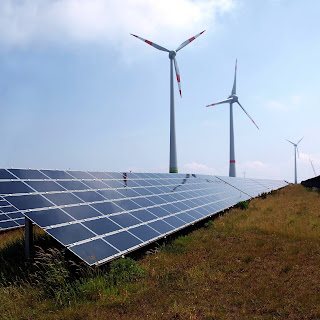Everyone has the power to transform electricity and reduce costs, carbon and outages by shifting when we use non-time-sensitive appliances from the 3-8pm peak to the midnight-7am trough - shift your dishwashers, washing machines, tumble driers and immersion heaters. Solve the energy trilemma now! Please comment!
Monday, 7 March 2016
Will Hinkley C go ahead?
Will Hinkley C go ahead? And if not, where does it leave UK generation policy?
Today the Chief Financial Officer of EDF resigned, highlighting the extraordinary distortion of EDF's business that the Hinkley project would cause.
It would involve EDFselling off other assets,and restructuring share ownership, to pursue a commercially questionable project dependent on UK Government and Chinese support.
But without Hinkley C we will need either
- an expansion of gas fired CCGT stations, with the carbon and supply risks that entails
- or a behavioural change by the consumer to limit peak demand
I prefer the latter!
Read all about it on It's Time to Chop the Peak
Thursday, 14 January 2016
Bring your own thermostat!

As usual, American electricity utilities are well ahead of UK in thinking about and testing peak reduction ideas. It's easier for them because there are a large number of independent grids with scope for smaller scale innovation.
Nonetheless, they still have difficulty in seeing how a project in one area can be repeated elsewhere, see
http://www.utilitydive.com/news/bring-your-own-thermostat-demand-management-programs-could-be-a-3b-marke/412003/
I remain convinced that this is a behavioural not a primarily technical issue, and the sooner we have an awareness campaign that goes beyond blogs like this the better! Tell your friends!
Monday, 7 December 2015
The message about awareness, altruism and peer pressure is going mainstream...thanks to Lord Deben and Sustainable Homes
Sustainable Homes, the accreditation body for housing organisations, has produced an excellent new report on what actually motivates home dwellers to change their energy behaviour,
Awareness, altruism and peer pressure all feature. They even mention peak demand issues on their site, although this is not yet centre stage.
Friday, 13 November 2015
Regen SW starting to put more emphasis on demand response
Now that the distribution capacity issues have become terminal for new PV in Devon and Cornwall, Regen SW is shifting the emphasis towards demand response and curtailed feed in periods for future PV installations, see
http://www.regensw.co.uk/wp-content/uploads/2015/06/Regen-SW.pdf
The well-named Tamar Bourne is leading this project under the able leadership of Merlin Hyman, their wizard CEO.
Let's hope it catches on!
Tuesday, 21 July 2015
Does renewable electricity reduce our need for conventional power stations?
Renewable electricity is often referred to as the answer to our need to reduce carbon and save the planet from climate change.
But does it?
In UK, we have three main sources of renewables -
- Hydro, which is reliable and can be switched on at times of high demand, and is about 2% of national capacity
- PV, which generates when the sun shines, mainly in summer -and certainly not at 5:30pm in winter when peak demand occurs-
- Wind, which is intermittent and can not be relied upon to generate at peak consumption times.
So the picture for renewables in relation to peak demand is bleak - or is it?
As private PV owners are discovering, it is well worth our while shifting the time at which we use electricity away from peak times and into times of low demand - and also into times of high renewable generation.
It's much easier to do than most people think - we can delay the on times of dishwashers, washing machines and tumble driers into the middle of the night - or use them in summer when the sun is shining. We can put a time switch on our immersion heater and keep it off between 3 and 8pm - I keep mine off for a lot longer with no loss of convenience.
All that is missing is public awareness of the value of doing so - if that were present then peer pressure would do the rest - look at recycling and where that was 30 years ago.
So do it and tell your friends!
Friday, 10 July 2015
Demand Response and storage - how much of each do we need? Wattstor may have part of the answer.

A new company in Cornwall - Wattstor - has a useful piece of kit which enables PV system owners to dramatically reduce the amount of electricity they need from the grid in summer. It stores surplus electricity during the day - up to 6kWh - which is then available in the evening.
I spent over £12,000 on a 4kW PV system , so I am a prime candidate for Wattstor.
Will it make any difference to peak winter electricity demand - when there is very little daytime PV generation?
The Wattstor system costs several thousand pounds - mainly for batteries. If it shifts sufficient summer electricity from day to evening, it will pay for itself.
Delay timers and time switches will have the effect in winter of reducing peak demand at low cost with high reliability.
Perhaps someone could do the sums to calculate the ROI and carbon reduction of each approach?
Monday, 8 June 2015
Where will the drive for domestic demand response come from?
Domestic consumers in UK could - as I have outlined - with modest efforts reduce peak consumption by 7GW. Simultaneously, they could shift demand into summer troughs, thus easing the strain on the system caused by solar PV, and allowing more of it to be installed.
Who will start the ball rolling? OFGEM? The DNO's? DECC? The big six? National Grid? Or you and I!
What do you think?
Be the first to comment below...
Subscribe to:
Posts (Atom)




